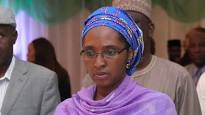The Minister of Finance, Mrs. Zainab Ahmed, on Friday restated Federal Government’s commitment to supporting Small and Medium Enterprises (SMEs), start-ups and emerging industries through supportive fiscal policies to sustain the nation’s economic growth trajectory.
This is even as she maintained that government would also continue to encourage investors to stake their funds in critical sectors of the economy.
Ahmed made the commitment at the opening session of 4th Meeting of the ECOWAS Finance Ministers on the Consolidation of ECOWAS Customs Union in Abuja.
She explained that these measures were being adopted “with a view to achieving the effective implementation of the country’s Agricultural Promotion Policy (APP) and the Nigeria Industrial Revolution Plan (NIRP) within the transitional period of 5 years of implementation of the GET (2015-2019).”
The minister pointed out further that that the country’s position was without prejudice to the spirit of regional integration and free trade protcols as Nigeria has been in the forefront of regional trade policies advocacy over the past years.
According to her, like every developing economy, Nigeria’s vision to industrialize is very strong. Accordingly, we believe ECOWAS Common External Tarrif (CET) should be designed to promote regional industrialization in a manner that on the long term reduces dependence on imports.
Ahmed explained: “We will continue to work within ECOWAS to achieve these laudable objectives. Nigeria believes fervently that ECOWAS regional policies such as the CET, the Customs Union and other fiscal policies should aim seriously at achieving economic growth and industrialization for member states, while reducing import dependency.
“Nigeria therefore believes West Africa, while desiring integration into the global economy, should diversify its economy through manufacturing, processing of primary products and other forms of economic modernization” she added.
The minister noted that to this end, Nigeria effectively commenced the implementation of the ECOWAS CET in April 2015, with additional measures under the ECOWAS approved Supplementary Protection.
She identified some of the measures taken by the Nigerian government to promote this agenda as including “an Import Adjustment Tax (IAT) List which involves additional taxes on 177 Tariff Lines of the CET 2015 2019; A National list consisting of items whose import duty rates have been reviewed downwards to encourage rapid development in strategic sectors of the economy and an import Prohibition List (Trade) applicable only to certain goods originating from Third Countries.”
“The draft regulations on an ECOWAS Tax Treaty Model and Mutual Assistance in Tax Collection can potentially ease tax treaties negotiations among the member-states, eliminate tax evasion/avoidance within the region, encourage tax audit and exchange of tax information as well as enhance regional integration.
“As a matter of fact, these regulations will also assist to deepen the integration of the region with the global strategies to improve public revenue through the elimination of tax malpractices” the minister added.
She assured participants and government representatives from the sub-region of Nigeria’s commitment to a sustainable, functional regional economic integration project that will, in the long run, facilitate economic growth and social prosperity for the peoples of West Africa.






